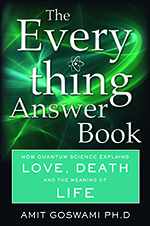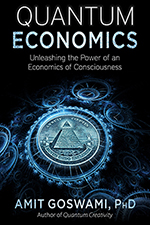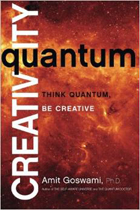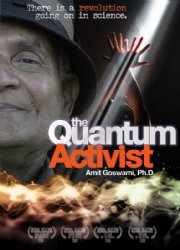The Potentialities of Human Freedom
By Amit Goswami, Ph.D.
Freedom of choice is big in America. On the first Independence Day after 9/11, the Knight Rider media group did a survey about what makes America great. The overwhelming answer was: freedom of choice.
And yet, roughly 40% of Americans are not religious, and twenty-five million nonreligious Americans are avowed atheists. It is safe to assume that a substantial number of atheists are, in one form or another, scientific materialists as are many people who call themselves liberals. Why is this important data? Because the scientific materialist picture of the human being is that all humans are determined machines, human free will is an illusion. There is no freedom of choice!
Go figure. This is a prime example of worldview confusion that we Americans suffer from. On one hand, people profess the worldview of Scientific Materialism. On the other hand, they continue to value Freedom of Choice.
But perhaps I am being too hasty. After all, one survey does not prove anything. But how about an experiment carried out at Stanford University? In a preliminary experiment, a researcher gave a mixed bunch of American and Indian students five pens to choose from: one blue and the other four red. Guess what? The Indians are conformists; they uniformly chose red. And Americans invariably chose the unique blue showing their tendency for the freedom to be unique. If this is not conclusive enough, in a second experiment, the researcher took away the pen the student chose and offered him or her the pen of the other color. Again, the Indian students could not care less. But the Americans were uniformly unhappy. Wrote the researcher: “Taking away their choice threatens their freedom.”
No, there is no doubt about it! Americans value freedom, freedom to choose. I have mentioned religious freedom before. Although the founding culture was overwhelmingly Christian (albeit of a variety of different denominations), freedom to pursue any religious creed was built into our Constitution.
I must also mention freedom of expressing sexuality. Religions, specifically Christianity, are not especially friendly to sexuality, so the liberals are not friendly to Christianity either; they like sex too much. Scientific materialism is preferable to Christianity for many liberals because sociobiology supports and explains some of the expressions of human sexuality. For example, the harem fantasy of many males finds a justification from the sociobiological study of male lions and their prides.
In a previous blog, I called a human consciousness (ego) having this kind of freedom of choice an ice cream consciousness. It is certainly important to have the limited choice of which flavor of ice cream I want.
In the 2016 election cycle in America, the Republican field of candidates in August 2015 solidified to a big number of 17. Of this, sixteen were fairly indistinguishable: they walked like a Republican, talked like a Republican, and laughed like a Republican. So, it was safe to assume that they were all genuine Republicans. The seventeenth one, Donald Trump, did not fit the mold. And yet he has been the choice of most Republicans so far in 2015! Freedom of choice ice cream consciousness style? You bet.
And I will have to be honest. Materialists do try to explain a limited version of freedom to choose with their models of the human brain as a neural network. The process leading to conditioned response to a stimulus, they say, produce grooved pathways in the network. So, when the stimulus arrives the response of the brain follows the conditioned pathway. One can condition a brain for a spectrum of responses to the same stimulus. This certainly is a limited version of choice!
Communism, although much maligned in America, was, objectively speaking, a worthy competitor of the democracy/capitalism/dogma-free liberal education model of human society. On the face of it, communism has the commendable goal of establishing true economic equality among all people. The leaders got bogged down on the “how to do it?” problem and their so-called dictatorship of the proletariat degenerated into dictatorship of a few backed by a huge privileged bureaucracy. People of Soviet Russia all had jobs though; and there was no unemployment if one was not a dissident. But naturally no one had the choice for which kind of job they got.
So the Soviet system broke down. Even a conditioned spectrum of the freedom of choice matters to humans. But today in America and the economically affluent countries of the First World, with political and economic restructuring that has been going on ever since the eighties, the job market has a similar problem as the Soviets. People can get jobs but there is not much choice for getting jobs that people really want, jobs that are meaningful for people.
And this is the point. We can give people different flavors of ice cream but that does not satisfy if one does not want ice cream! The job of a waiter at a McDonald’s or Wendy’s or another hamburger restaurant chain is plenty available today. But if people want to say “no” to a waiter’s job and instead want something meaningful, there is real scarcity.
This would never be a problem if we were truly neural networks that do not have a conditioned grooved pathway pertaining to saying “no” to a conditioned response to a stimulus. However, as the experiments of Benjamin Libet and collaborators have demonstrated (see my book Quantum Creativity), human beings do have the ability to say “no” to conditioning.
So getting such a limited freedom of choice is not enough for human beings. The model of a grooved neural network for the human ego is faulty. We want more than just variety of the same basic thing; we want individual meaning in what we choose.
And here is another shortcoming for the brain model of who we are. A brain is just like a computer; it cannot process meaning, no algorithmic system can. It takes a mind to process meaning. And it takes creativity to process new meaning.
You don’t hear conservative politicians talking much about meaning and creativity for ordinary people (the 99%), but fortunately liberals do talk about them. And here is their opportunity to see the shortcoming of the scientific materialism model of us and opt for something immensely more accurate for describing a real human, the quantum model.
The fact is, we humans are not determined machines. Who are we then? We have the ego no doubt, but we are also a self beyond ego. Call it a “higher” self if you want to; that is what spiritual traditions call it. In the new science, we call it the quantum self. The potentiality of human freedom goes far beyond what we thought it was even a few decades ago!
Lewis Brandeis, the famous Supreme Court justice, once said, “America has believed that in differentiation, not in uniformity, lies the path of progress. It acted on this belief; it has advanced human happiness, and it has prospered.” All materialist models of us make a shortchanged homogeneous picture of the human ego: similar sociocultural conditioning produces the same average ego with very small differentiation. Creative pursuit of meaning gives us the differentiation that we Americans are famous for!
Brandeis was speaking of a time when our worldview was modernism; mind was part of the equation for us then. Since the nineteen eighties, instead of a dualist worldview, we have a dual worldview and worldview polarization. Fortunately, the quantum worldview gives us our mind back, our creativity back, and all this without dualism and with integration of both worldviews.
I mentioned Donald Trump. His slogan is, “I will make America great again.” I don’t know what Mr. Trump means by great (hating Mexican immigrants certainly does not make one great!), but I side with Brandeis. To make America great again, to make any country great again today, we need diversity and heterogeneity, not uniformity and homogeneity. We emphasize ego enough, the emphasis in our schools still is the three R’s—reading (w)riting, and (a)rithmetic. This tends to make us homogeneous. What is the secret of being heterogeneous, being a true individual? It is cultivating the quantum self within us, cultivating intuition and creativity. When we are a nation of creative individuals, today’s elitism in politics will give way to a participatory democracy.



